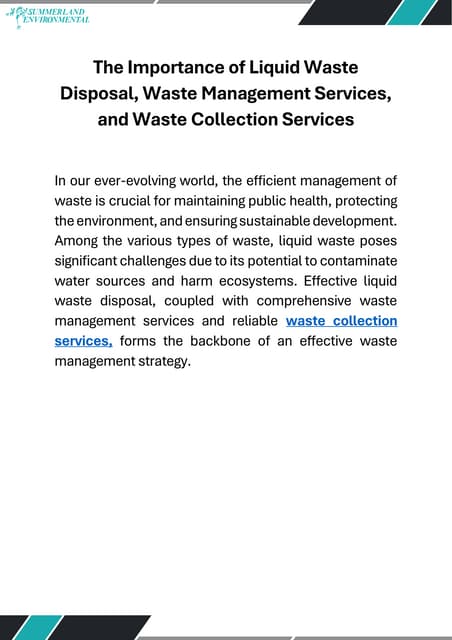The Of Reclaim Waste
The Of Reclaim Waste
Blog Article
Reclaim Waste Fundamentals Explained
Table of ContentsReclaim Waste - The FactsUnknown Facts About Reclaim WasteUnknown Facts About Reclaim WasteThe Greatest Guide To Reclaim WasteHow Reclaim Waste can Save You Time, Stress, and Money.
With proper fluid waste monitoring, companies can lower energy-intensive treatment procedures and disposal prices. By complying with a system for managing fluid waste, firms can avoid expensive fines and charges and stay clear of adverse publicity.(http://peterjackson.mee.nu/do_you_ever_have_a_dream#c2256)Accumulate representative samples from various factors within the waste stream to guarantee accuracy. Fluid waste, specifically hazardous ones, poses considerable threats during this action.

Disinfection (e.g., chlorination, ultraviolet light, ozonation) and nutrient elimination (e.g., denitrification and phosphorus elimination) are recommended under rigorous guidelines. Countless business violated a number of liquid waste disposal policies in recent years.
The 15-Second Trick For Reclaim Waste

are utilized by markets that generate huge quantities of low-toxicity fluid waste. Superficial basins include liquid waste that is enabled to evaporate through natural procedures. The residue left can be dealt with in landfills. entails melting fluid waste at heats and converting it right into gas and ash. This kind of disposal goes through rigorous environmental regulations due to potentially hazardous exhausts.
The searchings for must be documented, evaluated, and saved not just for entry to regulatory authorities yet also for making enhancements in the future. Use dependable equipment, approaches, and software solutions to ensure precise and constant information collection. Stay updated on pertinent ecological guidelines and sector requirements. Share information with pertinent stakeholders (e.g., employees, governing federal government agencies, and nearby areas) to maintain openness and responsibility.
Recognizing these can assist them properly handle their operations and lessen their environmental impact. Companies that can't invest in centers should think about collaborating with the public market for better remedies.
Reclaim Waste Can Be Fun For Everyone
By implementing detailed administration systems that consist of treatment and reusing methods, routine monitoring, risk evaluations, and adherence to neighborhood and government laws, industrial facilities can add to the security of groundwater materials, ensuring their availability for future generations (liquid waste disposal). Allow's explore the importance of effective liquid waste monitoring in the commercial market, focusing on its implications for protecting groundwater sources
The pollution of groundwater sources due to incorrect fluid waste monitoring in the commercial field has far-ranging consequences for human health and wellness, farming, straight from the source and the environment in its entirety. A few of the prospective influences triggered by such pollution include: Contaminated Alcohol consumption Water Products: As groundwater provides a significant portion of our drinking water, contamination from industrial tasks can lead to damaging chemicals and microbes entering our water supply, presenting health dangers for people.
Minimized Agricultural Efficiency: Agriculture counts heavily on groundwater for irrigation; therefore, polluted water can hinder plant yields, contaminate agricultural items, and affect food security. Offered the value of maintaining groundwater resources, it is critical for businesses to take a proactive position in managing their liquid waste responsibly and preventing pollution.
10 Simple Techniques For Reclaim Waste
Fluid waste can contaminate land and contaminate waters. Under the Defense of the Setting Workflow Act 1997, companies that create fluid waste are needed to handle it in a way that protects the setting and the community. Information about dealing with and saving fluid waste, replying to spills and decreasing fluid waste is available in the following fact sheets and advice:.
Water, the significance of life, is under consistent threat from contamination. The duty of waste management experts in guarding this priceless source can not be overemphasized. Their solutions include: Septic system and grease trap cleansing: Important for stopping damaging toxins from entering our water supply. Contaminated water and contaminated effluent administration: Making sure that unsafe liquids are securely eliminated and dealt with before they can harm our water sources.
Hence, integrating lasting fluid waste management into economic preparation improves financial security and shields the setting, showing the worth of this technique. In conclusion, taking on expert fluid waste monitoring methods is crucial for guaranteeing a sustainable future, shielding our setting and protecting the well-being of future generations.
When it involves getting rid of waste, adhering to correct treatments is essential for a multitude of factors. Proper waste disposal is not nearly cleanliness; it's about making certain the wellness of our setting, health, and the reliable use sources. Understanding the relevance of efficient waste administration can assist us all contribute to a much healthier, cleaner planet.
The 8-Second Trick For Reclaim Waste
Effective waste administration aids maintain clean streets and public rooms, minimizing the aesthetic influence of trash and ensuring that waste does not damage wildlife. When waste is not gotten rid of appropriately, it can cause air pollution, where hazardous materials can seep into the dirt, water supply, and the air, developing long-term environmental issues.
Report this page